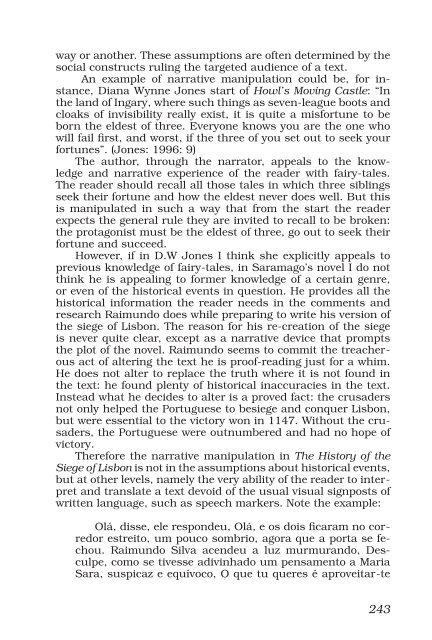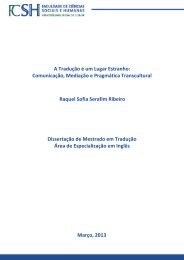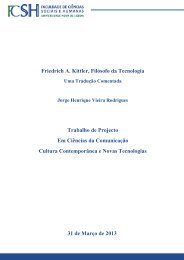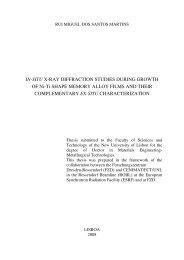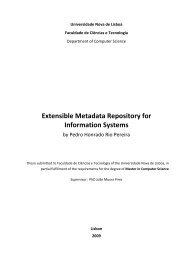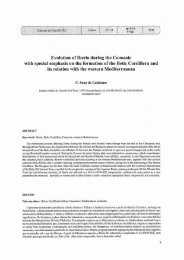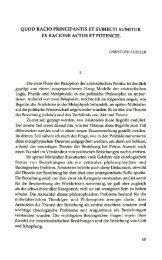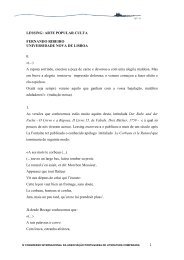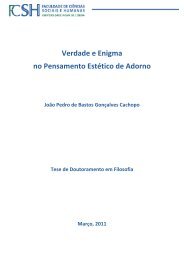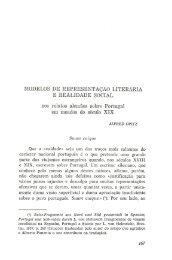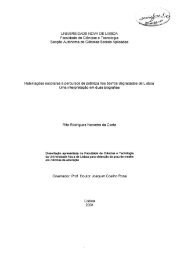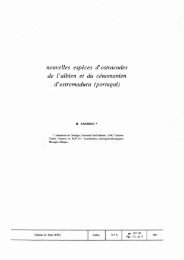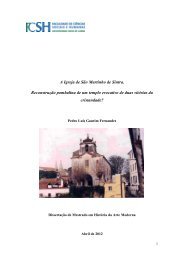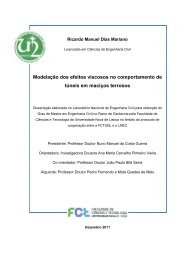Untitled - RUN UNL - Universidade Nova de Lisboa
Untitled - RUN UNL - Universidade Nova de Lisboa
Untitled - RUN UNL - Universidade Nova de Lisboa
You also want an ePaper? Increase the reach of your titles
YUMPU automatically turns print PDFs into web optimized ePapers that Google loves.
way or another. These assumptions are often <strong>de</strong>termined by the<br />
social constructs ruling the targeted audience of a text.<br />
An example of narrative manipulation could be, for instance,<br />
Diana Wynne Jones start of Howl’s Moving Castle: “In<br />
the land of Ingary, where such things as seven-league boots and<br />
cloaks of invisibility really exist, it is quite a misfortune to be<br />
born the el<strong>de</strong>st of three. Everyone knows you are the one who<br />
will fail first, and worst, if the three of you set out to seek your<br />
fortunes”. (Jones: 1996: 9)<br />
The author, through the narrator, appeals to the know-<br />
ledge and narrative experience of the rea<strong>de</strong>r with fairy-tales.<br />
The rea<strong>de</strong>r should recall all those tales in which three siblings<br />
seek their fortune and how the el<strong>de</strong>st never does well. But this<br />
is manipulated in such a way that from the start the rea<strong>de</strong>r<br />
expects the general rule they are invited to recall to be broken:<br />
the protagonist must be the el<strong>de</strong>st of three, go out to seek their<br />
fortune and succeed.<br />
However, if in D.W Jones I think she explicitly appeals to<br />
previous knowledge of fairy-tales, in Saramago’s novel I do not<br />
think he is appealing to former knowledge of a certain genre,<br />
or even of the historical events in question. He provi<strong>de</strong>s all the<br />
historical information the rea<strong>de</strong>r needs in the comments and<br />
research Raimundo does while preparing to write his version of<br />
the siege of Lisbon. The reason for his re-creation of the siege<br />
is never quite clear, except as a narrative <strong>de</strong>vice that prompts<br />
the plot of the novel. Raimundo seems to commit the treacherous<br />
act of altering the text he is proof-reading just for a whim.<br />
He does not alter to replace the truth where it is not found in<br />
the text: he found plenty of historical inaccuracies in the text.<br />
Instead what he <strong>de</strong>ci<strong>de</strong>s to alter is a proved fact: the crusa<strong>de</strong>rs<br />
not only helped the Portuguese to besiege and conquer Lisbon,<br />
but were essential to the victory won in 1147. Without the crusa<strong>de</strong>rs,<br />
the Portuguese were outnumbered and had no hope of<br />
victory.<br />
Therefore the narrative manipulation in The History of the<br />
Siege of Lisbon is not in the assumptions about historical events,<br />
but at other levels, namely the very ability of the rea<strong>de</strong>r to interpret<br />
and translate a text <strong>de</strong>void of the usual visual signposts of<br />
written language, such as speech markers. Note the example:<br />
Olá, disse, ele respon<strong>de</strong>u, Olá, e os dois ficaram no cor-<br />
redor estreito, um pouco sombrio, agora que a porta se fechou.<br />
Raimundo Silva acen<strong>de</strong>u a luz murmurando, Desculpe,<br />
como se tivesse adivinhado um pensamento a Maria<br />
Sara, suspicaz e equívoco, O que tu queres é aproveitar-te<br />
243


